As of 2010, the United States had approximately 53,364 living centenarians (people above the age of 100). What’s even more impressive is the fact that 39 people across the globe have lived to, or are currently, 115 years old!
Now, you may have read stories of centenarians who owe their longevity to drinking a beer a day, but these individuals should be viewed as rare cases.
So before I get your hopes up, this article is not about a secret diet pill or detox kit that’s guaranteed to make you live longer.
Rather, I’ll be showing you a combination of foods to help you become a full fledged centenarian yourself.
Antioxidants
 For starters, in order to surpass the double digits, you’ll need to protect yourself.
For starters, in order to surpass the double digits, you’ll need to protect yourself.
Environmental pollutants, harmful food additives, and certain medications are just a few foes working against your long lifespan. These result in the creation and spread of free radicals in your body.
Free radicals are essentially “highly reactive atoms” that set off chain reactions inside of us. These reactions have a domino-like effect so the response spreads to nearby cells. The problem is that free radicals damage our DNA and cell membranes, and as a result, our cells don’t function as they should. They can even die from this process.
That’s why antioxidants are such a lifesaver. You can think of antioxidants as powerful little ninjas that spend their days karate-chopping and fighting off free radicals.
By definition, antioxidants are “chemicals that can prevent or slow cell damage. An ‘antioxidant’ is actually not a substance; it’s a behavior”.
Antioxidants are not a magic pill that you take each day like a multivitamin – you must consume them in the foods you eat on a regular basis. Trust me, loading up on antioxidant-rich foods will solidify your spot in the forever-young centenarian squad. You literally cannot beat the longevity-boosting health benefits antioxidants provide.
These bad boys stop free radicals in their tracks and terminate the reactions before they lead to a health scare. Meaning your cells suffer less damage and keep on being healthy.
I’ve outlined some of my favorite antioxidant-rich foods in this superfoods article, but as a quick recap, here are a few foods to keep on hand at all times:
- Berries such as blueberries, raspberries, cranberries, and strawberries
- Dark, leafy veggies like kale, spinach, and mustard and turnip greens
- Spices such as cinnamon, ginger, oregano, basil, thyme, and cumin
- Nuts like walnuts, pecans, and hazelnuts
- Green tea
You’ll want to incorporate these foods into your daily meals starting today. Yes, today! Don’t put off protecting your cells another minute longer.
The good news is that foods packed with these wonderful antioxidants taste better than junk food.
Fiber-Rich Foods
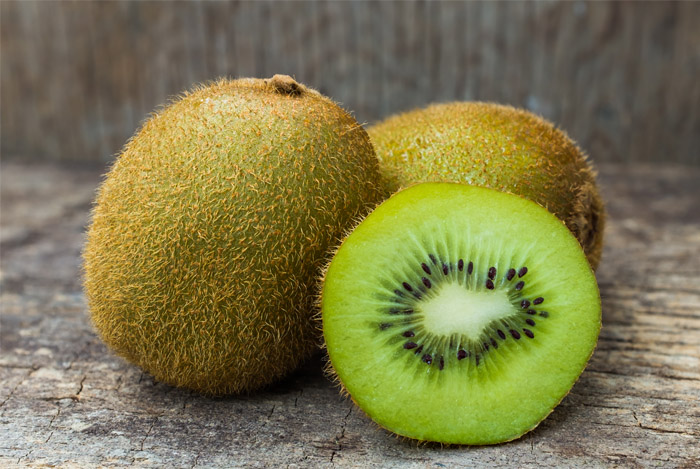 You probably don’t associate fiber-rich foods with living longer – I know I didn’t at first – but you will now because the health benefits of fiber are many.
You probably don’t associate fiber-rich foods with living longer – I know I didn’t at first – but you will now because the health benefits of fiber are many.
In short, fiber is awesome because it:
- Helps control blood sugar levels
- Reduces our risks for serious conditions such as heart disease, diverticulitis, and stroke
- Lowers risk of developing hemorrhoids
- Prevents gallstones and kidney stones
- Helps promote weight loss
As you can see, fiber is similar to antioxidants in the fact that it protects us and keeps us healthy.
Since fiber can reduce our risk of chronic, and sometimes deadly conditions, while also helping us keep those extra pounds off, it’s a perfect ally for helping you live longer.
Adequate Amounts of Protein
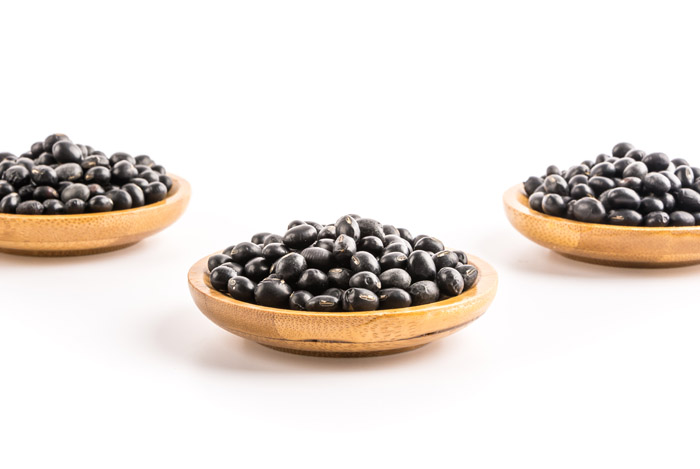 In addition to eating more fiber-rich foods every day, you’ll also want to weave in adequate amounts of protein too.
In addition to eating more fiber-rich foods every day, you’ll also want to weave in adequate amounts of protein too.
Similar to antioxidants and fiber, proteins protect us by providing immune support so we’re able to fight off foreign invaders that want to make us sick.
But protein goes even further that that because it can also:
- Provides tissue support so we can stand and move
- Maintains proper fluid balances
- Transports essential nutrients
- Builds muscles and bones
- Balances our pH levels
Harvard School of Public Health (HSPH) tells us that:
“High-protein food choices do play a role in health – and that eating healthy protein sources like fish, chicken, beans or nuts in place of red meat can lower the risk of several diseases and premature death”.
These diseases include cardiovascular disease, diabetes, certain cancers, and osteoporosis.
However, according to HSPH, there’s growing research to support that it’s more about quality versus quantity when it comes to protein.
Consuming high amounts of red meat – I’m looking at you Atkins and Paleo followers – is not the route to take.
According to an article in LiveScience, one study “found that middle-age people who ate foods rich in animal proteins – including meat, milk and cheese – were 75% more likely to die of any cause than those who ate a low-protein diet within the study period”.
That’s why I recommend not only eating adequate amounts of protein (i.e. not going overboard or under here), but choosing the right kinds of proteins to help you live longer.
For an average (sedentary) man, 56 grams of protein is more than enough, while a female should aim for around 46 grams each day. Of course, these numbers will vary if you’re more active.
As for the types of protein to eat, try to replace the standard red meat in your diet with the following lifespan-lengthening options:
- Chicken
- Tuna
- Halibut
- Sardines
- Salmon
- Nuts
- Quinoa
- Beans
- Edamame
- Lentils
- Eggs
- Whey protein
Add Vegetarian Days to Your Week
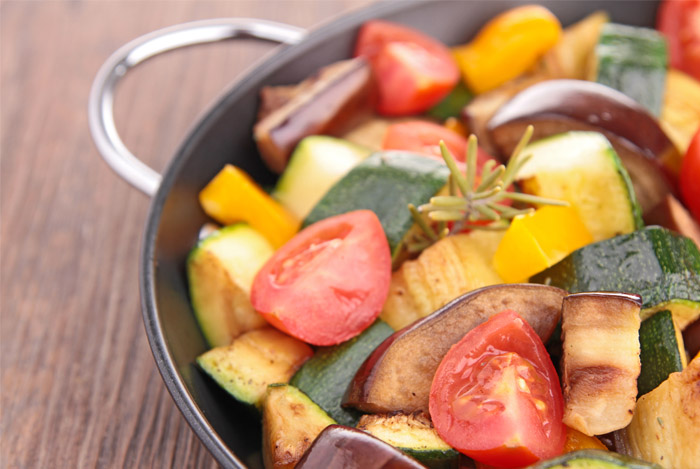 I’ve mentioned before that your mom was right when she told you to eat your veggies. They’re packed with vitamins, minerals, antioxidants, and sometimes a bit of fiber and protein too.
I’ve mentioned before that your mom was right when she told you to eat your veggies. They’re packed with vitamins, minerals, antioxidants, and sometimes a bit of fiber and protein too.
Vegetables are essential on many levels because they reduce our risk of chronic disease such as stroke, cancer, type 2 diabetes, and heart disease.
Now, I’m not saying you should become a straight up vegetarian, but becoming a once or twice-a-week vegetarian is a sneaky, smart, and pretty painless way to add more veggies to your life.
For some recipe ideas and meal inspiration, check out my article featuring 11 Vegan Recipes. They’re so delicious you may be tempted to eat vegetarian more than once a week.
5 Foods to Add Each Week for Longevity
To help you live a long, healthy life, the following foods should be included in your weekly menu.
Avocados
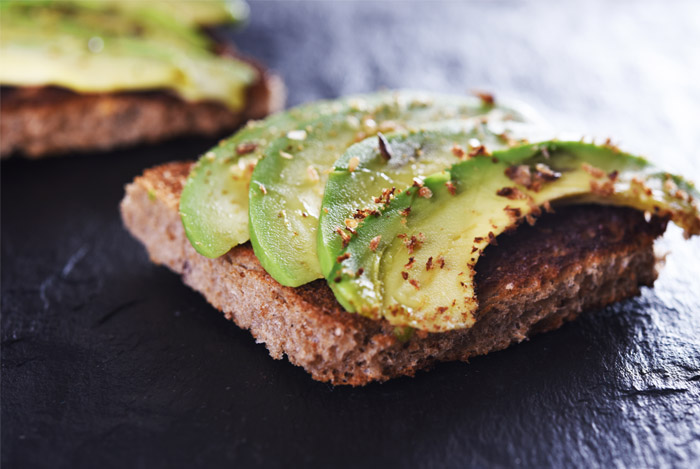 I love avocados almost as much as I love eggs.
I love avocados almost as much as I love eggs.
And when it comes to living longer, they can be a huge help thanks to the fact that one cup of cubed avocado is loaded with:
- 10 g of fiber
- 3 g of protein
- 14.7 g of heart healthy monounsaturated fat
- 2.7 g of polyunsaturated fat
- 25% of your DV of vitamin C (antioxidant)
- 39% of your DV of vitamin K (antioxidant)
- 16% of your DV of vitamin E (antioxidant)
- 5% of your DV of iron
- 30% of your DV of folate
- 21% of your DV of potassium
With one cup of avocados (about what you’d put on top of a vegetarian salad), you’ll enjoy fiber, protein, vitamins, and minerals. But best of all: avocados contain a special group of antioxidants known as polyphenols.
According to the Global Healing Center, polyphenols protect our skin from UV damage, provide holistic support for our brains, support normal blood sugar and blood pressure levels, and reduce our risk for cardiovascular disease, making them perfect for anyone trying to live longer.
Beans
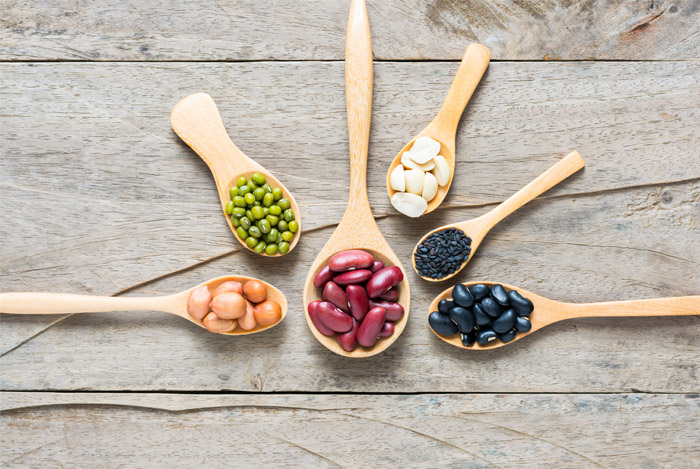 You may be surprised to learn that beans can actually help you live longer.
You may be surprised to learn that beans can actually help you live longer.
According to the Positive Choice Integrative Wellness Center: “Researchers found for every 2 tbsp of beans people ate their risk of death decreased by 8%”.
The article continues on to say that black beans, lentils, and kidney beans have the highest antioxidant levels in the bean crew.
But don’t ignore those other magical beans; all beans will provide you with lots of healthy protein and fiber, plus antioxidants, vitamins, and minerals. All from one tasty, low-calorie, life-extending food.
Nuts (Walnuts, Pistachios, Almonds)
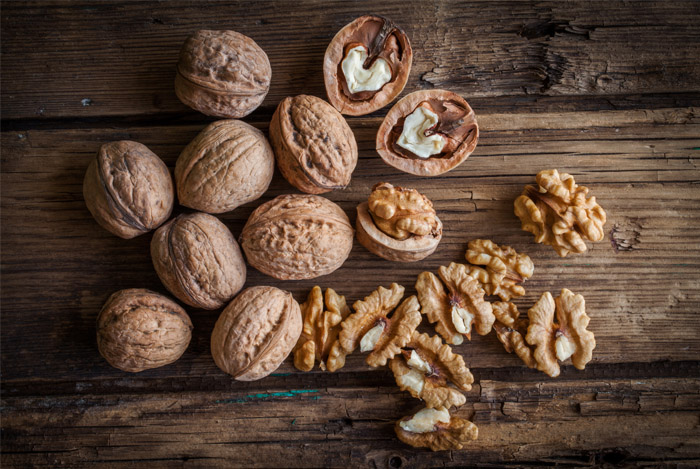 If you’re a regular reader, you’re probably already familiar with my love of almonds and nuts in general.
If you’re a regular reader, you’re probably already familiar with my love of almonds and nuts in general.
That’s because they’re loaded with healthy fats, antioxidants, fiber, and essential vitamins and minerals. They may even help you live longer!
Dr. Mercola examined a large, 30-year Harvard study which claims that:
“People who ate a small handful (approximately 1 ounce) of nuts seven times per week or more were 20 percent less likely to die for any reason, compared to those who avoided nuts”.
A more recent study measured how eating nuts, peanuts, or peanut butter affected mortality rates for specific diseases.
The research proved that those who consumed nuts (excluding peanut butter) had “lower overall and cause-specific mortality rates (cancer, diabetes, cardiovascular, respiratory, neurodegenerative) in men and women”, as compared to those who did not consume nuts at all.
According to Maastricht University, where the study was conducted, “the reduction in mortality was strongest for respiratory disease, neurodegenerative disease, and diabetes, followed by cancer and cardiovascular diseases”.
With such promising health benefits, there’s no excuse not to add nuts to your daily snacking.
To eyeball a healthy serving size of nuts, the Kitchn has a handy guide with pictures of what 100 calories looks like for different nuts. Most servings weigh in around 18 g, which is more than enough to see those health benefits I’ve listed above.
Green Tea
 Another healthy favorite of mine is green tea. I love it so much that I drink it daily and even use it to make my fat melting drink once a month.
Another healthy favorite of mine is green tea. I love it so much that I drink it daily and even use it to make my fat melting drink once a month.
Most of us know green tea as a traditional Japanese tea that’s very popular as a natural weight loss and metabolism boosting aid. But it’s way more powerful than being a waistline trimmer. You’ll be able to live longer thanks to the polyphenols (antioxidants) found in green tea.
Research on 40,000 Japanese men and women found that drinking this calming beverage can protect you against heart disease. Plus, participants who consumed more than five cups of green tea per day saw a 16% lower risk of heart disease and a 26% lower rate of death as compared to those who only drank one cup per day.
I like to drink 1–2 cups of caffeinated green tea (it’s pretty light on the caffeine) in the morning and early afternoon (before 3 pm). Then I’ll enjoy 1–2 cups of decaf green tea after 3 pm. It’s especially helpful post dinner when those pesky dessert cravings tend to strike.
Oats
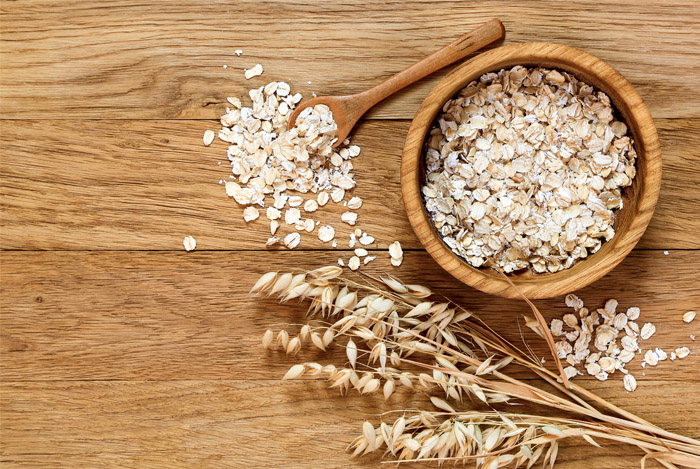 Oats should be another dietary staple to include in your daily menu plans.
Oats should be another dietary staple to include in your daily menu plans.
Similar to green tea, oats have been promoted as a weight loss aid.
Oats keep you feeling full and satisfied and help control blood sugar levels. This means you’ll have stable energy supplies and keep fatigue away. Oats will also destroy your cravings for unhealthy, sugary foods.
But you want to know how oats will keep you feeling young well into your golden years. Get this: oats protect you from deadly diseases such as heart disease, diabetes, and cardiovascular disease.
Researchers at Harvard examined two studies that looked at food intake for 100,000 individuals over the course of 14 years. They found that those “who ate 33 grams of whole grains daily – equivalent to a bowl of oatmeal – cut their risk of premature death by 9 percent compared to those who barely ate whole grains at all”.
As Qi Sun, one of the study’s authors, explains:
“Whole grains may protect the heart by lowering blood sugar and insulin levels…This type of property could improve insulin resistance to lower the risk of cardiovascular disease and diabetes”.
Asparagus
 Asparagus may be another food on my list that you wouldn’t expect to see.
Asparagus may be another food on my list that you wouldn’t expect to see.
Avocados and asparagus share one particular ingredient (among a few others) known as glutathione, which has been called “The Mother of All Antioxidants”.
I’d have to agree that it’s one of the best.
According to the Huffington Post, our bodies naturally produce glutathione, but factors like “poor diet, pollution, toxins, medications, stress, trauma, aging, infections and radiation all deplete your glutathione”, which means we must obtain it from the foods we eat.
That’s where avocados and asparagus come in. Both are filled with this powerful compound, which breaks down harmful carcinogens and free radicals. This helps combat diseases and keeps us living longer.
Asparagus is a “very good source of fiber, vitamins A, C, E and K, as well as chromium, a trace mineral that enhances the ability of insulin to transport glucose from the bloodstream into cells”.
Chromium is essential for ladies suffering with PCOS since managing insulin levels can be one of the biggest challenges.
As you can see, there isn’t one food you can eat to live longer, rather, it’s a culmination of powerful, natural ingredients working in harmony together. By eating whole, unprocessed foods, you’ll be one step closer to living past 100 and becoming part of the centenarian club.
Do you know anyone over 100 years old? What do they attribute their long, healthy life to? I’d love to hear about them in the comments!
The post 10 Foods You Should Be Eating To Live Longer appeared first on Nutrition Secrets.
http://www.nutritionsecrets.com/foods-to-live-longer/
No comments:
Post a Comment